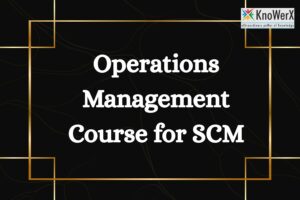Easy Steps to Manage Internal Operations and Inventory
Managing internal operations and inventory effectively is one of the most crucial responsibilities for any organization. Inefficient practices can lead to higher costs, stockouts, excess inventory, and dissatisfied customers. On the other hand, streamlined processes ensure smooth functioning, cost savings, and long-term growth.

At KnoWerX, we believe that success in supply chain management comes from a balanced mix of standardized practices, modern technology, and skilled professionals. With over 33 years of combined experience in consultancy and training, we help organizations and individuals master the art of managing internal operations and inventory with ease.
Below are some easy steps and practical tips that can transform how your organization manages resources, operations, and inventory.
Standardize Processes
Consistency is key in managing internal operations and inventory. When processes are standardized, employees know exactly what steps to follow, reducing errors and confusion. Create detailed Standard Operating Procedures (SOPs) for inventory handling, storage, order fulfillment, and returns. This ensures smooth operations and better accountability across teams.
Use Technology & Automation
Manual processes can slow down operations and increase chances of error. Leveraging technology such as ERP systems, inventory management software, and automation tools can drastically improve efficiency. For example, barcode scanning, RFID tags, and automated order processing can save time and provide real-time visibility into internal operations and inventory.
Track Inventory Accurately
Accurate inventory records are the backbone of effective management. Regular audits, cycle counting, and digital tracking ensure you always know what stock is available and where it is located. Businesses that prioritize accuracy in internal operations and inventory management avoid both overstocking and stockouts, ultimately improving profitability.
Classify Inventory (ABC Analysis)
Not all inventory holds the same value. Applying the ABC Analysis helps in classifying items based on importance:
- A-items: High-value items with lower sales frequency
- B-items: Moderate value and demand
- C-items: Low-value but high-frequency items
This classification allows businesses to prioritize resources and focus on what matters most in their internal operations and inventory strategy.
Forecast Demand Effectively
Accurate demand forecasting is vital to avoid excess or insufficient inventory. Use historical sales data, seasonal trends, and advanced forecasting tools to predict demand patterns. This practice allows businesses to align internal operations and inventory with actual market needs, reducing waste and increasing customer satisfaction.
Optimize Warehouse Layout
A well-organized warehouse ensures quick access to inventory, reduced handling time, and lower operational costs. Group items logically, label storage areas clearly, and implement efficient shelving systems. Optimizing warehouse layouts enhances the overall performance of internal operations and inventory while improving employee productivity.
Monitor KPIs Regularly
Key Performance Indicators (KPIs) are essential to measure the effectiveness of your strategies. Monitor metrics such as order accuracy, inventory turnover ratio, carrying cost, and stockout rate. By consistently tracking these KPIs, businesses can identify gaps in internal operations and inventory management and make timely improvements.
Train Employees
Employees play a pivotal role in executing strategies. Regular training on handling procedures, safety measures, and technology use ensures that your workforce is equipped to maintain operational efficiency. At KnoWerX, we emphasize professional growth through education, enabling employees to manage internal operations and inventory with confidence and competence.
Build Strong Supplier Relationships
Suppliers directly impact the flow of inventory. Building strong, transparent, and reliable supplier relationships ensures timely deliveries, better negotiation opportunities, and greater flexibility during demand fluctuations. Robust partnerships support seamless internal operations and inventory management, particularly in volatile markets.
Frequently Asked Questions
Why is managing internal operations and inventory important?
Managing internal operations and inventory effectively helps businesses reduce costs, avoid stockouts, prevent excess inventory, and deliver a smooth customer experience. It ensures operational efficiency and long-term growth.
What role does standardization play in inventory management?
Standardized processes, such as SOPs for inventory handling and order fulfillment, minimize errors, enhance consistency, and improve accountability across teams.
How can technology improve internal operations and inventory control?
Technology such as ERP systems, barcode scanning, RFID tags, and automation tools provides real-time visibility, reduces manual errors, speeds up processes, and supports data-driven decision-making.
Ending Notes

Effective management of internal operations and inventory is not just about cost control it is about creating a foundation for sustainable growth. From process standardization to leveraging automation, accurate tracking, and employee training, every step contributes to building a more resilient supply chain.
At KnoWerX, we go beyond theory. Through our professional training programs and globally recognized certifications, we empower professionals to adopt best practices in supply chain management. With decades of experience in training and consultancy, we are committed to helping individuals and organizations optimize their internal operations and inventory strategies for long-term success.
If you are looking to enhance your knowledge and skills, KnoWerX is your one-stop destination to learn, grow, and thrive in the ever-evolving world of supply chain management.
Image Reference: Freepik
Disclaimer: All trademarks, logos, and brand names are the property of their respective owners. All company, product, and service names used in this website are for identification purposes only. Use of these names, trademarks, and brands does not imply endorsement.



